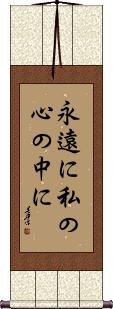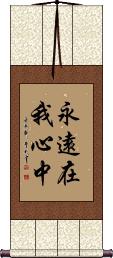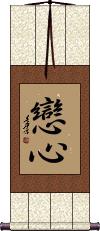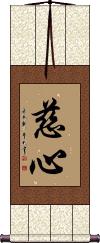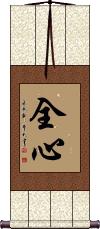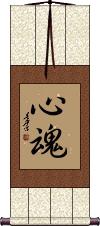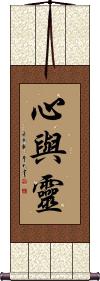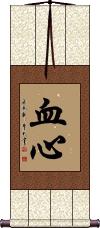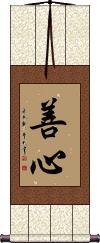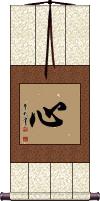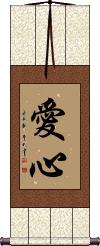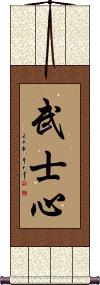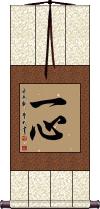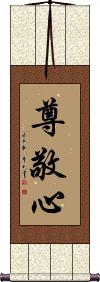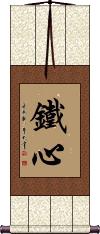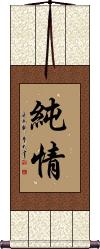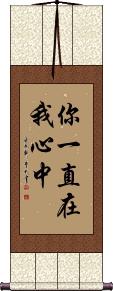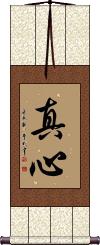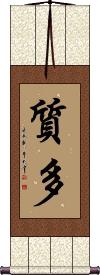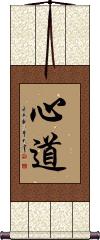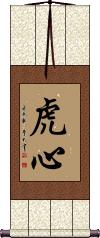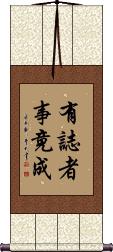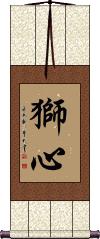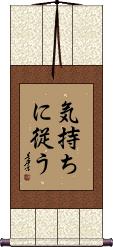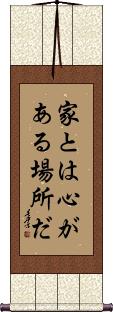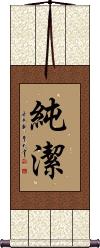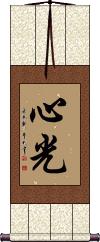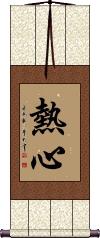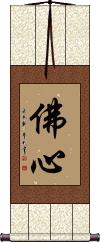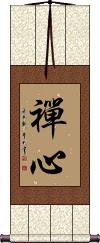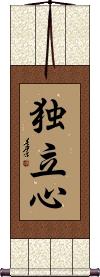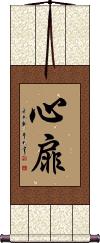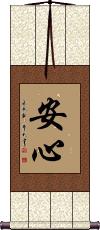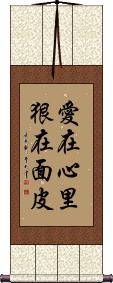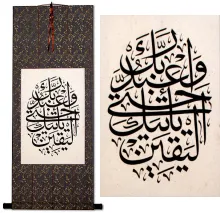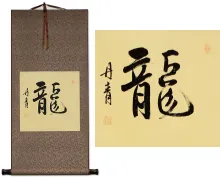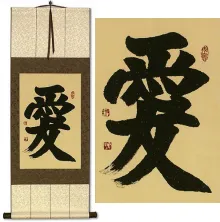Many custom options...
And formats...

Heart in Chinese / Japanese...
Buy a Heart calligraphy wall scroll here!
Personalize your custom “Heart” project by clicking the button next to your favorite “Heart” title below...
3. Compassionate Heart / Benevolent Heart
5. Whole Heart
9. Good Heart
12. Heart of a Warrior / Samurai Heart
13. One Heart / One Mind / Heart and Soul
14. Listen to Your Heart / Follow Your Heart
15. Respectful Heart
17. With all the strength of your heart
18. Lion Heart
19. Iron Heart
20. Sisters at Heart
21. Pure Heart
22. You are Always in My Heart
23. True Heart
24. Warrior’s Heart
25. Home is where the heart is
26. Thinking Heart
27. Tao / Dao of the Heart / Soul
28. Tiger Heart
29. To a Willing Heart, All Things Are Possible
30. Heart of Aikido
32. Lion Heart
33. Brave Heart
34. Trust Your Heart
38. Home is where the heart is
40. Work Together with One Heart
41. Merciful Heart / The Light from a Buddha Mind
43. Buddha Heart / Mind of Buddha
45. Beautiful Heart / Beautiful Mind
46. Strong-Willed / Strong of Heart
47. Independent Spirit / Independent Heart
49. Peaceful Heart / Peace of Mind / Calm Mind
50. Beautiful Heart / Beautiful Spirit
Forever In My Heart
Forever In My Heart
Forever In My Heart
永遠に私の心の中に means “forever in my heart” or “always in my heart” in Japanese.
The character breakdown:
永遠 (eien) eternity; perpetuity; immortality; permanence.
に (ni) indicates the location of a person or thing.
私の (watashi no) my; mine.
心の中 (kokoro no naka) the middle of one's mind; the midst of one's heart.
に (ni) indicates the location of a person or thing (makes this “in” the middle of one's heart).
Note: There’s more than one way to say "Forever in My Heart" in Japanese, so you’ll find another version in our database. This is the very verbose version.
Note: Because this selection contains some special Japanese Hiragana characters, it should be written by a Japanese calligrapher.
Forever In My Heart
Loving Heart / One’s Love
戀心 literally means “loving heart.” It can also be translated as “one's love” or “awakening of love.”
戀心 is used exclusively for love between boyfriends and girlfriends or husband and wife.
Breaking down the meaning of each Kanji, the first means love, affection, or tender passion. The second Kanji means heart, mind, or soul (most will read it as the heart).
See Also: Compassion | Love
Compassionate Heart / Benevolent Heart
Benevolent Heart
慈悲の心 means benevolent heart, compassionate heart, or merciful heart in Japanese.
This is a Japanese-only phrase and should be ordered from our Japanese master calligrapher. This is because the third character is unique Hiragana.
Chances are you are into Inuyasha and are seeking the title of chapter 471 which is often translated as “Merciful Heart.”
Whole Heart
Heart and Soul
心魂 is “heart and soul” in Japanese Kanji.
The first character means heart (but can also mean mind or soul).
The last character means soul or spirit (spiritual essence).
Heart and Soul
Always in My Heart
永駐我心 is one of a few ways to write “always in my heart” or “forever in my heart” in Chinese.
The first character means eternal, forever, or always.
The second character means resides, in, or stationed (in the case of troops).
The third character means me, my, or mine.
The last character means heart (but can also mean mind or soul).
Sincere Heart
When you take 血心 apart, you find the sum is slightly different than the parts. The first character means blood, and the second means heart. It is important to note that for thousands of years, it was believed that your heart was both your soul and your mind in Asian culture. When you add blood to the heart, it is your whole being - the pure and clean dedication of your whole soul.
Most Chinese dictionaries define this as the sincerity of heart or a MEDICAL TERM!!!
Please think carefully before ordering this selection - it was only added as others have used this for coffee cups and other novelties (though perhaps naively).
Good Heart
A heart of kindness, benevolence, and virtuous intentions
善心 literally reads “Good Heart” but is used to refer to the ideas of kindness, benevolence, philanthropy, virtuous intentions, moral sense, and conscience.
Some will also translate this as the morality of mind (as the character for the heart is often used to mean mind).
In Japanese, this can be the given name Yoshinaka.
Heart / Mind / Spirit
心 would often be translated as “heart.”
However, because it was believed in Chinese culture for thousands of years that your consciousness and thoughts came from the big red organ in the middle of your chest, it also means “mind” or “spirit” and sometimes even “soul.”
In Korean, beyond heart, mind, and spirit, this character can mean moral, nature, mind, affections, intentions, core, and center. In fact, it is used in Chinese to mean “center” as well but only with another character in front of it. For instance, “medical center” or even “shopping center.” Separately and alone, it will not be read with that “center” meaning unless thought of as “the center of your soul.”
Loving Heart / Compassion
愛心 literally means “loving heart.” It can also be translated as “compassion.”
In Chinese, it carries more of a compassionate meaning.
愛心 is rarely used in Japanese anymore, so best if your audience is Chinese.
See Also: Compassion | Love
Heart of a Warrior / Samurai Heart
One Heart / One Mind / Heart and Soul
一心 literally reads as “one heart” in Chinese, Japanese Kanji, and old Korean Hanja.
Colloquially or figuratively, it means: wholeheartedly; heart and soul; of one mind; wholeheartedness; one's whole heart; with the whole mind or heart; one mind in heart.
I'm not kidding, all of those came right from the dictionary for this one title.
In Buddhism, this can refer to the bhūtatathatā, or the whole of things; the universe as one mind, or a spiritual unity.
In Japanese, this can be the female given name, Hitomi.
Listen to Your Heart / Follow Your Heart
隨心而行 is the closest way to express this idea in Chinese. Literally translated, this phrase means “Allow your heart to dictate your behavior” or “Let your heart guide your conduct” in Chinese. You could also translate this as “follow your heart.” Or, with a bit of imagination, it could mean: “let your spirit be your guide.”
Note that in some cases, “heart” can mean “mind,” “soul” or even “spirit” in Chinese. In ancient China, it was thought that the big pumping organ in your chest was where your thoughts came from, or where your soul resides.
Ancient western thought followed a similar belief. Thus phrases like “I love you with all my heart” and “I give you my whole heart.”
Respectful Heart
尊敬心 means respectful heart in Japanese, Chinese and Korean.
The root is 尊敬 which means respect, honor, reverence, esteem, and/or nobility. Therefore, you can also define this as an honorable heart, reverent heart, noble heart, etc.
In ancient times, it was thought your brain was the heart in your chest. Therefore, 心 or heart can also mean “mind.” Hence, 尊敬心 can also be translated as respectful mind, honorable mind, etc.
You'll see 尊敬心 romanized as Sonkeishin or Sonkeshin from Japanese.
Heart of a Warrior
With all the strength of your heart
思い切り can be translated as “with all one's strength,” “with all one's heart,” “to the limits of your heart,” or “to the end of your heart/emotions.”
The character breakdown:
思い (omoi) thought; mind; heart; feelings; emotion; sentiment; love; affection; desire; wish; hope; expectation; imagination; experience
切り (kiri) bounds; limits.
Note: Because this selection contains some special Japanese Hiragana characters, it should be written by a Japanese calligrapher.
Lion Heart
Iron Heart
鐵心 can be translated as “iron heart,” “steel core,” or “iron mind” in Chinese and Japanese Kanji.
This is not a common term, but I added it here since so many were looking for “iron heart.” This is almost like saying you are without emotions or feelings - a very stoic person. This is not a Buddhist trait.
Sisters at Heart
The love between sisters
Pure Heart
Pure and Innocent
純情 means “Pure Heart” in Chinese, Japanese Kanji, and old Korean Hanja.
It's used to reflect the ideas of being “pure and innocent.”
Depending on the context in which this title is used, it can relay “self-sacrificing devotion” or, in some cases, “naïveté.”
This would be in the same way we might refer to a young girl giving her lunch money to a beggar on the street. She has a pure and precious heart but perhaps is also a bit naive.
You are Always in My Heart
True Heart
While 真心 literally reads as “true heart” or “genuine heart,” the understood meaning is sincerity, devotion, sincere, or heartfelt. Some will extend the meaning to be like “true love.” It's the idea of doing something or treating someone with genuine feelings.
真心 is valid and has the same meaning in both Chinese characters and Japanese Kanji.
Note: While not too common, this can be the female given name “Mami” in Japanese.
Warrior’s Heart
Home is where the heart is
家由心生 is an old Chinese proverb that is roughly equal to the English idiom “Home is where the heart is.”
If you know Chinese, you may recognize the first character as home and the third as the heart.
Thinking Heart
Tao / Dao of the Heart / Soul
心道 means “The Way of the Heart” or “The Way of the Soul.” The first character means “heart” but can also mean soul, spirit, mind, or your essence. In this case, it is most accurately translated with the heart or soul meaning.
The second character is Dao as in Daoism. Please note, this is the same thing as Tao as in Taoism (just Romanized differently - it's always been the same in Chinese for about 2300 years.
Tiger Heart
To a Willing Heart, All Things Are Possible
Where there is a will, there is a way
有志者事竟成 is an old Chinese proverb that has been translated many different ways into English. As you read the translations below, keep in mind that in Chinese, heart=mind.
Nothing is impossible to a willing heart.
Nothing is impossible to a willing mind.
Nothing is difficult to a willing heart.
Where there is a will, there is a way.
Nothing in the world is impossible if you set your mind to doing it.
A willful man will have his way.
If you wish it, you will do it.
A determined heart can accomplish anything.
All things are possible with a strong mind.
Heart of Aikido
Aikido no Kokoro
Soul Mates at Heart
心の伴侶 is a Japanese-only title for soulmates.
心 means heart, soul, mind, core, or center. In ancient times, the heart was believed to be the mind or center of your soul and being.
の is a possessive article that connects everything here.
伴侶 means mates, companions, partners, and spouses.
This Japanese version of soulmates is about two partners, coupled or joined by their hearts.
Lion Heart
Brave Heart
Trust Your Heart
Lion Heart Kyokushin-Do
Follow Your Heart
気持ちに従う is a Japanese phrase that means follow your heart.
The first part of this Japanese proverb means feeling, sensation, or mood.
The second part suggests the following, abiding by, or listening to this inner feeling.
In this context, you could say it means your heart, as the whole proverb suggests that you follow the feelings that you have inside.
Note: Because this selection contains some special Japanese Hiragana characters, it should be written by a Japanese calligrapher.
Set your heart ablaze
Home is where the heart is
家とは心がある場所だ is, “Home is where the heart is,” in Japanese.
Most Japanese will take this to mean:
If you are with the person or at the place you love most, it becomes your true home.
Note: Because this selection contains some special Japanese Hiragana characters, it should be written by a Japanese calligrapher.
Chastity / Pure Heart
Also: Clean / Innocent / Pure
純潔 is associated with “chastity” but with the direct meaning of clean, innocent, and pure.
If you were expressing the idea of a “pure heart” in Chinese, while not literal, this would be the word you would use.
In Japanese, this word is sometimes used to express purity.
In Korean, it describes purity, chastity, virginity, and innocence (basically the same as the Chinese definition).
Work Together with One Heart
Merciful Heart / The Light from a Buddha Mind
心光 can mean the light from a Buddha's mind or “merciful heart.”
This would especially be the light emanating from Amitābha.
Note that the character 心 can mean mind or heart. 光 means light or brightness - but in this context can suggest a glow of mercy or compassion.
This can also be a Japanese surname that is romanized as Shinkou or Shinko.
Enthusiasm / Warm-Hearted
熱心 literally means “warm-hearted” (can also mean warm-spirited or warm-souled).
This is one of a few ways to say Enthusiasm in Chinese, Japanese Kanji, and old Korean Hanja.
熱心 is also used to express the ideas of earnestness or eagerness.
Can mean “zeal” in Japanese.
Buddha Heart / Mind of Buddha
佛心 means the Buddha's mind, Buddha-heart, or the spiritually enlightened heart/mind.
The Buddha Heart is detached from good and evil and other such constructs. The Buddha Heart has mercy, compassion, and loving-kindness for all sentient life, the good, the wicked, and all in between.
The heart and mind (心) are the same concepts in the ancient Orient, so you can use heart and mind interchangeably in this context.
Zen Heart / Zen Mind
禪心 represents an image of your meditation coming from and filling your heart.
The meaning of the first character is “meditation” and the second character is usually defined as “heart” or sometimes “mind.”
There is a two-fold meaning here, as a good meditation session must start with a centered heart or mind. Yet at the same time, meditation serves to cleanse, focus, and center the heart and mind.
Beautiful Heart / Beautiful Mind
Strong-Willed / Strong of Heart
気の強い means strong-willed or strong of heart in Japanese.
Here's the character breakdown of this Japanese title:
気 (ki) spirit; mind; heart; nature; motivation; intention; feelings; essence.
の (no) possessive particle.
強い (tsuyoi) strong; powerful; mighty; potent; resistant; resilient; durable.
Note: Because this selection contains some special Japanese Hiragana characters, it should be written by a Japanese calligrapher.
Independent Spirit / Independent Heart
獨立心 means independent spirit or independent heart in Japanese.
The first two characters mean independent or independence. The third character means spirit, heart, or mind.
獨立心 is a Japanese term, although Chinese people could guess the meaning (the characters make sense individually in Chinese but are not often used this way). Also, the first character would be written 獨 in Traditional Chinese versus 独 which is the Simplified Chinese and modern Japanese version.
Inner Heart / Inner Soul
Peaceful Heart / Peace of Mind / Calm Mind
安心 can be defined as relief, peace of mind, feeling at ease, to be relieved, to set one's mind at rest, and easiness.
安心 is a nice word that encompasses great meanings within just two characters. Some of the other meanings include pacifying, settling the mind, and peace of mind. It's also the idea of feeling a sense of security, safety, and confidence in your state of well-being.
This can be used by everyone, but some consider it to be a Buddhist concept (You'll find it in your Zen dictionary).
Note: Can be romanized as Anshin or Anjin in Japanese.
Beautiful Heart / Beautiful Spirit
Holding Flowers with Subtle Smile
An idiom for heart-to-heart communication
拈華微笑 is a Chinese, Korean, and Japanese Buddhist title that relays the idea of “heart-to-heart communication,” or “thought transference.”
The literal translation is, “holding a flower and subtly smiling,” or “the holding of a flower with a subtle smile.” It is the visual act and emotion that communicates more volume than words can say.
Love Your Children, But Discipline Them Too
This in-stock artwork might be what you are looking for, and ships right away...
These search terms might be related to Heart:
A Wise Man Changes His Mind (But a Fool Never Will)
Advance Bravely / Indomitable Spirit
Alert / on Guard / Lingering Mind
An Open Book Benefits Your Mind
Be Master of Mind, Not Mastered by Mind
Beautiful Heart / Beautiful Mind
Beautiful Heart / Beautiful Spirit
Beautiful Mind
Beautiful Spirit
Bodhicitta: Enlightened Mind
Body and Mind
Body Mind Spirit
Buddha Heart / Mind of Buddha
Calm and Open Mind
Compassion
Compassion / Kindness
Courageous Spirit
Divine Spirit
Dragon Spirit
Empathy / Humanity
Esprit De Corps / Team Spirit
Feeling of Bliss
Fighting Spirit
Free Spirit
Fruit of the Spirit
Ghost / Soul / Spirit
God in the Glorious Center of Heaven
Goddess of Beauty / Beautiful Spirit
Goddess of Compassion
Goddess of Mercy and Compassion
Heart / Mind / Spirit
Heijoshin / Presence of Mind
Heroic Spirit
Heroic Spirit / Great Ambition
Heroic Spirit / Heroism
Holy Spirit / Holy Ghost
Immovable Mind
Independent Spirit
Independent Spirit / Independent Heart
Indomitable Spirit
Indomitable Spirit / Indomitable Attitude
Inner Beauty / Beauty of Spirit
Inugami / Dog Spirit
Kindness
Kindness / Benevolence
Kindness / Caring
Kindness and Forgiving Nature
Lingering Mind
Listen With Open Mind
Love and Affection
Love and Respect / Kindness and Respect
Loving Heart / Compassion
Loving-Kindness Conquers All
Merciful Heart / the Light From a Buddha Mind
Mercy / Compassion / Buddhist Loving Kindness
Mercy / Compassion / Love
Mind Body Spirit
Mind Like Water
Mind of the Beginner
Mind Over Matter
Mind Your Own Business
Mind’s Eye
Morality of Mind
No Mind / Mushin
Old, but More Vigorous in Spirit
One Heart / One Mind / Heart and Soul
One Mind / Unity
Open and Calm Mind
Open Mind
Patience Brings Peace of Mind
Patience Yields Peace of Mind
Peace of Mind
Peaceful Heart / Peace of Mind / Calm Mind
Perfectly Sincere Mind
Pleasant Feeling
Presence of Mind
Prideful Mind / Self-Respecting Heart
Purified Spirit / Enlightened Attitude
Purity of Mind
Resolute Mind
Seeking Mind
Sorrow / Feeling Sorry
Soul / Spirit
Spirit
Spirit / Soul
Spirit / Spiritual Essence
Spirit of Taekwondo
Spirit of the Dragon Martial Arts
Spiritual Strength / Strength of Spirit
Stable - Mind at Peace
Strong Body, Strong Mind
Strong Mind Strong Body
Taekwondo Tenets / Spirit of Taekwon-Do
The Bodhi Mind
The Middle Way
The Nature of Enlightenment in One's Mind
The Original Mind
The Spirit of Dragon and Tiger
The Spirit of the Dragon Horse
The Spirit of the Dragon Horse and Power of a Tiger
Truth Flashed Through the Mind
Tsuki No Kokoro / Mind Like the Moon
Warrior Essence / Warrior Spirit / Martial
Warrior Soul / Heroic Spirit
Warrior Soul / Spirit of a Fighter
Wolf Spirit / Soul of a Wolf
Work Together With One Mind
Zen Heart / Zen Mind
The following table may be helpful for those studying Chinese or Japanese...
| Title | Characters | Romaji (Romanized Japanese) | Various forms of Romanized Chinese | |
| Forever In My Heart | 永遠在我心 永远在我心 | yǒng yuǎn zài wǒ xīn yong3 yuan3 zai4 wo3 xin1 yong yuan zai wo xin yongyuanzaiwoxin | yung yüan tsai wo hsin yungyüantsaiwohsin |
|
| Forever In My Heart | いつまでも私の心の中に | i tsu ma de mo watashi no kokoro no naka ni | ||
| Forever In My Heart | 永遠に私の心の中に | ei en ni watashi no kokoro no naka ni | ||
| Forever In My Heart | 永遠在我心中 永远在我心中 | yǒng yuǎn zài wǒ xīn zhōng yong3 yuan3 zai4 wo3 xin1 zhong1 yong yuan zai wo xin zhong yongyuanzaiwoxinzhong | yung yüan tsai wo hsin chung yungyüantsaiwohsinchung |
|
| Loving Heart One’s Love | 戀心 恋心 | koi gokoro / koigokoro | ||
| Compassionate Heart Benevolent Heart | 慈心 | jishin | cí xīn / ci2 xin1 / ci xin / cixin | tz`u hsin / tzuhsin / tzu hsin |
| Benevolent Heart | 慈悲の心 | ji hi no kokoro jihinokokoro | ||
| Whole Heart | 全心 | zenshin | quán xīn / quan2 xin1 / quan xin / quanxin | ch`üan hsin / chüanhsin / chüan hsin |
| Heart and Soul | 心魂 | shin kon / shinkon | ||
| Heart and Soul | 心與靈 心与灵 | xīn yǔ líng xin1 yu3 ling2 xin yu ling xinyuling | hsin yü ling hsinyüling |
|
| Always in My Heart | 永駐我心 永驻我心 | yǒng zhù wǒ xīn yong3 zhu4 wo3 xin1 yong zhu wo xin yongzhuwoxin | yung chu wo hsin yungchuwohsin |
|
| Sincere Heart | 血心 | xuě xīn / xue3 xin1 / xue xin / xuexin | hsüeh hsin / hsüehhsin | |
| Good Heart | 善心 | yoshinaka | shàn xīn / shan4 xin1 / shan xin / shanxin | shan hsin / shanhsin |
| Heart Mind Spirit | 心 | kokoro | xīn / xin1 / xin | hsin |
| Loving Heart Compassion | 愛心 爱心 | ài xīn / ai4 xin1 / ai xin / aixin | ai hsin / aihsin | |
| Heart of a Warrior Samurai Heart | 武士心 | bu shi kokoro bushikokoro | wǔ shì xīn wu3 shi4 xin1 wu shi xin wushixin | wu shih hsin wushihhsin |
| One Heart One Mind Heart and Soul | 一心 | isshin / ishin | yī shì dài yi1 shi4 dai4 yi shi dai yishidai | i shih tai ishihtai |
| Listen to Your Heart Follow Your Heart | 隨心而行 随心而行 | suí xīn ér xíng sui2 xin1 er2 xing2 sui xin er xing suixinerxing | sui hsin erh hsing suihsinerhhsing |
|
| Respectful Heart | 尊敬心 | son kei shin sonkeishin | zūn jìng xīn zun1 jing4 xin1 zun jing xin zunjingxin | tsun ching hsin tsunchinghsin |
| Heart of a Warrior | 戰士之心 战士之心 | zhàn shì zhī xīn zhan4 shi4 zhi1 xin1 zhan shi zhi xin zhanshizhixin | chan shih chih hsin chanshihchihhsin |
|
| With all the strength of your heart | 思い切り | omoi kiri / omoikiri | ||
| Lion Heart | 獅子心王 狮子心王 | shi shi shin ou shishishinou shi shi shin o | ||
| Iron Heart | 鐵心 铁心 | tetsu kokoro / tesshin tetsukokoro / tesshin tetsu kokoro / teshin | tiě xīn / tie3 xin1 / tie xin / tiexin | t`ieh hsin / tiehhsin / tieh hsin |
| Sisters at Heart | 心の姉妹 | kokoro no shi mai kokoronoshimai | ||
| Pure Heart | 純情 纯情 | jun jou / junjou / jun jo | chún qíng chun2 qing2 chun qing chunqing | ch`un ch`ing chunching chun ching |
| You are Always in My Heart | 你一直在我心中 | nǐ yī zhí zài wǒ xīn zhōng ni3 yi1 zhi2 zai4 wo3 xin1 zhong1 ni yi zhi zai wo xin zhong niyizhizaiwoxinzhong | ni i chih tsai wo hsin chung niichihtsaiwohsinchung |
|
| True Heart | 真心 | mago koro / magokoro | zhēn xīn / zhen1 xin1 / zhen xin / zhenxin | chen hsin / chenhsin |
| Warrior’s Heart | 勇士之心 | yǒng shì zhī xīn / / | ||
| Home is where the heart is | 家由心生 | jiā yóu xīn shēng jia1 you2 xin1 sheng1 jia you xin sheng jiayouxinsheng | chia yu hsin sheng chiayuhsinsheng |
|
| Thinking Heart | 質多 质多 | chitta | zhí duō / zhi2 duo1 / zhi duo / zhiduo | chih to / chihto |
| Tao Dao of the Heart Soul | 心道 | xīn dào / xin1 dao4 / xin dao / xindao | hsin tao / hsintao | |
| Tiger Heart | 虎心 | tora kokoro torakokoro | hǔ xīn / hu3 xin1 / hu xin / huxin | hu hsin / huhsin |
| To a Willing Heart, All Things Are Possible | 有志者事竟成 / 有誌者事竟成 有志者事竟成 | yǒu zhì zhě shì jìng chéng you3 zhi4 zhe3 shi4 jing4 cheng2 you zhi zhe shi jing cheng youzhizheshijingcheng | yu chih che shih ching ch`eng yuchihcheshihchingcheng yu chih che shih ching cheng |
|
| Heart of Aikido | 合気道の心 | ai ki dou no kokoro aikidounokokoro ai ki do no kokoro | ||
| Soul Mates at Heart | 心の伴侶 | kokoro no han ryo kokoronohanryo | ||
| Lion Heart | 獅心 狮心 | shī xīn / shi1 xin1 / shi xin / shixin | shih hsin / shihhsin | |
| Brave Heart | 勇敢的心 | yǒng gǎn de xīn yong3 gan3 de xin1 yong gan de xin yonggandexin | yung kan te hsin yungkantehsin |
|
| Trust Your Heart | 相信你的心 | xiàng xìn nǐ dì xīn xiang4 xin4 ni3 di4 xin1 xiang xin ni di xin xiangxinnidixin | hsiang hsin ni ti hsin hsianghsinnitihsin |
|
| Lion Heart Kyokushin-Do | 獅子心極真道 | shi shi shin kyoku shin dou shishishinkyokushindou shi shi shin kyoku shin do | ||
| Follow Your Heart | 気持ちに従う | kimochi ni shitagau kimochinishitagau | ||
| Set your heart ablaze | 心を燃やせ | kokoro o mo ya se kokoroomoyase | ||
| Home is where the heart is | 家とは心がある場所だ | ie to wa kokoro ga aru basho da ietowakokorogaarubashoda | ||
| Chastity Pure Heart | 純潔 纯洁 | jun ketsu / junketsu | chún jié / chun2 jie2 / chun jie / chunjie | ch`un chieh / chunchieh / chun chieh |
| Work Together with One Heart | 齊心協力 齐心协力 | qí xīn xié lì qi2 xin1 xie2 li4 qi xin xie li qixinxieli | ch`i hsin hsieh li chihsinhsiehli chi hsin hsieh li |
|
| Merciful Heart The Light from a Buddha Mind | 心光 | shin kou / shinkou / shin ko | xīn guāng xin1 guang1 xin guang xinguang | hsin kuang hsinkuang |
| Enthusiasm Warm-Hearted | 熱心 热心 | nesshin / neshin | rè xīn / re4 xin1 / re xin / rexin | je hsin / jehsin |
| Buddha Heart Mind of Buddha | 佛心 | busshin / bushin | fó xīn / fo2 xin1 / fo xin / foxin | fo hsin / fohsin |
| Zen Heart Zen Mind | 禪心 禅心 | zen shin / zenshin | chán xīn / chan2 xin1 / chan xin / chanxin | ch`an hsin / chanhsin / chan hsin |
| Beautiful Heart Beautiful Mind | 美しい心 | utsukushii kokoro utsukushiikokoro utsukushi kokoro | ||
| Strong-Willed Strong of Heart | 氣の強い 気の強い | ki no tsuyo i kinotsuyoi | ||
| Independent Spirit Independent Heart | 獨立心 独立心 | dokuritsushin | ||
| Inner Heart Inner Soul | 心扉 | xīn fēi / xin1 fei1 / xin fei / xinfei | hsin fei / hsinfei | |
| Peaceful Heart Peace of Mind Calm Mind | 安心 | an shin / anshin | ān xīn / an1 xin1 / an xin / anxin | an hsin / anhsin |
| Beautiful Heart Beautiful Spirit | 美麗的心靈 美丽的心灵 | měi lì de xīn líng mei3 li4 de xin1 ling2 mei li de xin ling meilidexinling | mei li te hsin ling meilitehsinling |
|
| Holding Flowers with Subtle Smile | 拈華微笑 拈华微笑 | nenge misho nengemisho | niān huá wēi xiào nian1 hua2 wei1 xiao4 nian hua wei xiao nianhuaweixiao | nien hua wei hsiao nienhuaweihsiao |
| Love Your Children, But Discipline Them Too | 愛在心里狠在面皮 / 愛在心里狠在麵皮 爱在心里狠在面皮 | ài zài xīn lǐ hèn zài miàn pì ai4 zai4 xin1 li3 hen4 zai4 mian4 pi4 ai zai xin li hen zai mian pi aizaixinlihenzaimianpi | ai tsai hsin li hen tsai mien p`i ai tsai hsin li hen tsai mien pi |
|
| In some entries above you will see that characters have different versions above and below a line. In these cases, the characters above the line are Traditional Chinese, while the ones below are Simplified Chinese. | ||||
Successful Chinese Character and Japanese Kanji calligraphy searches within the last few hours...


